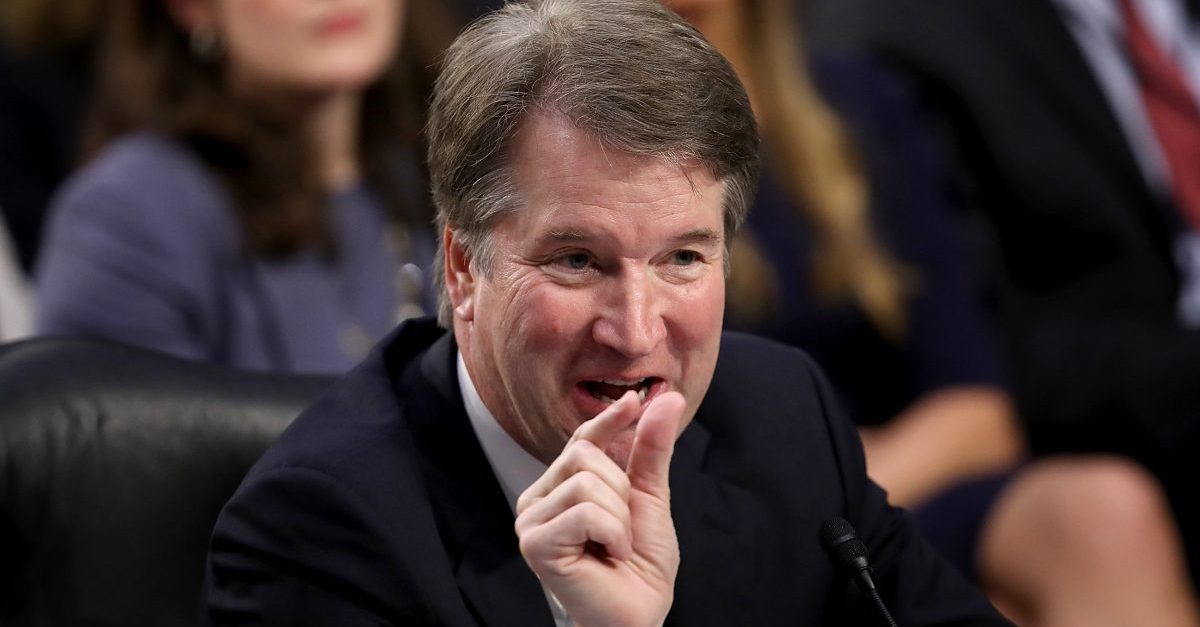
An application for the trademark “KAVANAUGH BEER” was filed with the U.S. Patent and Trademark Office (PTO) on Monday. According to an intellectual property expert, however, that application is likely “dead on arrival.”
Submitted by Brian William Chinavare from Lima, Ohio, the application makes a “standard character claim.” A standard character claim, as noted by the PTO, is not reliant upon any “particular font style, size, or color.” This means that Chinavare is essentially attempting to trademark the phrase “Kavanaugh Beer” itself–regardless of how that phrase is physically presented on any potential product.
Chinavare’s application also specifies that he only intends to apply the mark to “Spirits” which, by way of a recent update to U.S. trademark law, are categorized under the official U.S. trademark class numbers 047 and 049–those numbers specifically refer to “Wines; spirits and liqueurs.”
Regarding the application’s present status, the PTO application notes, “The trademark application has been accepted by the Office (has met the minimum filing requirements) and has not yet been assigned to an examiner,” and clarifies that the “[n]ew application will be assigned to an examining attorney approximately 3 months after filing date.”
So, does that mean that Chinavare has a few blissful months of waiting ahead? Not so much, according to trademark attorney and intellectual property law expert Roberto Ledesma. In an interview with Law&Crime, Ledesdma spelled out the likely trouble ahead for the “Kavanaugh Beer” claim.
“Any trademark application that contains somebody’s name–if that person identified in the trademark is alive–the US Patent and Trademark Office will require their consent in order for the trademark application to be approved,” Ledesma noted. “So, if the application is filed with ‘Trump’ in it, Trump himself would have to consent. There are a lot of [Trump applications] out there–and they’re all dead on arrival. He’s not going to consent.”
Because the Chinavare application is a clear-cut reference to embattled Supreme Court nominee Brett Kavanaugh‘s beer-drinking testimony in front of the Senate Judiciary Committee, the PTO will almost certainly deny the mark as well. Ledesma continued:
This trademark refers to Kavanaugh, it’s obviously a reference to Brett Kavanaugh and what went on during the Senate hearings last week, so if the examining attorney at the Patent and Trademark Office does what they’re supposed to do, they should refuse it under Section 2(c) of the Lanham Act–which states that you need a living individual’s consent to register a trademark with their name in it.
Ledesma went on, cautioning against people trying to trademark words or phrases because they receive a flurry of attention on the news.
“A lot of applicants see things that happen in the media–some catchphrases come up, things happen, rallying cries occur like with Charlie Hebdo–people see these things and they file trademark applications and think they’re going to gain exclusive rights and capitalize on them,” Ledesma said. “These applications are also often dead on arrival and applicants lose their money–they’re just not profiting from them at all.” As Ledesma previously explained in a post on his legal blog:
Trademarks are source identifiers. They point to a single source for certain goods and/or services. Common and popular rallying cries fail to function as trademarks because the public does not identify them with a single source. Instead, the public views them as conveying an informational message about the cause or issue being addressed.
And, Ledesma predicted as much with Chinavare’s October 1 filing. He said:
That’s what happened here with this applicant, he’s going to lose his money. It’s going to get refused and he’ll never get his money back. Assuming the registration isn’t approved, he could still try to use the trademark. But even if he starts selling beer with Brett Kavanaugh’s name on it, he could be sued by Kavanaug as a violation of his right to publicity. There’s a lot of legal risk and business risk in doing something like that. It’s always best to talk to an attorney before filing a trademark application.
[image via Win McNamee/Getty Images]